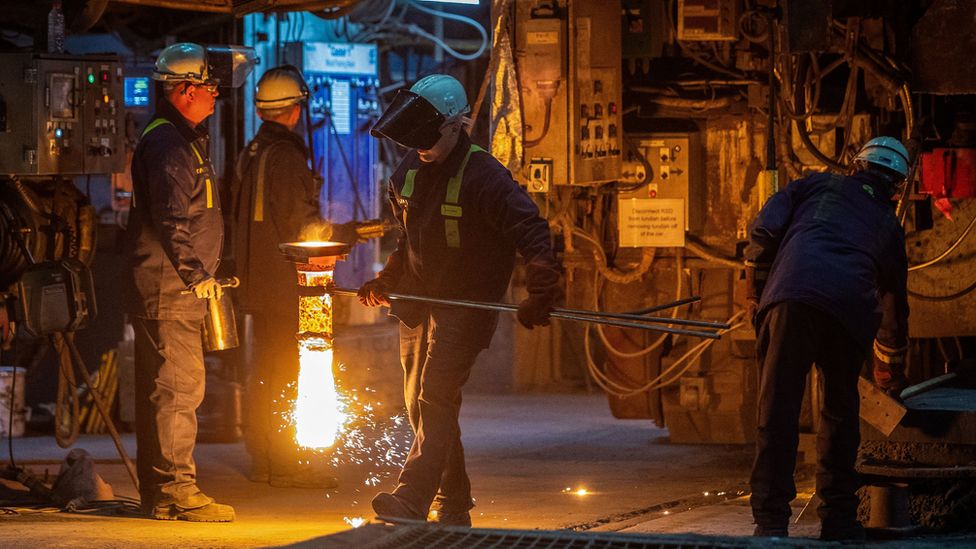 Image source, Getty Images
Image source, Getty Images
Up to 3,000 people across the UK could lose their jobs as a result of the funding deal
By Rowenna Hoskin & Thamayanthi McAllister
BBC News
Port Talbot's steelworks will be given up to £500m by the UK government in a bid to keep the plant open and produce steel in a greener way, but it could see thousands lose their jobs.
Tata Steel will add £700m of its own as it invests in cutting emissions. It has asked ministers to provide a bigger chunk of the cost.
But the package could mean as many as 3,000 job losses across the UK.
The site in south Wales is home to Britain's biggest steelworks.
The steelworks features two blast furnaces working around the clock to produce steel used in everything from tin cans to submarines.
But it is also one of the UK's largest polluters.
The UK government has agreed to fund the installation of new electric arc furnaces for steelmaking.
The £1.25bn furnaces are expected to be up and running within three years of getting regulatory and planning approvals.
The company warned there would be a "transition period including potential deep restructuring" at the plant.
The UK government said the deal "has the potential to safeguard over 5,000 jobs across the UK".
Tata Steel employs about 8,000 people in the UK, 4,000 of those in Port Talbot.
Image source, PA Media
Image caption,The site in Port Talbot is the biggest steelworks in Britain
Unions previously said the move to the new less labour-intensive furnaces could lead to thousands of job losses.
The UK government said the transition was expected to reduce the UK's entire business and industry carbon emissions by 7%, Wales's overall emissions by 22% and the Port Talbot site's emissions by 85%.
It also said the plan to replace existing coal-powered blast furnaces at the site would "reduce the UK's entire carbon emissions by around 1.5%".
Analysis by Simon Jack, BBC News business editor
For the government and the UK steel sector the £500m support package for Port Talbot's steelworks is an important intervention that secures an industry whose future, finances and emissions are unsustainable.
And, as government officials point out, it is much less than the £1.5bn Tata originally said was needed to save Port Talbot from possible closure.
For the Labour Party, it's another example of a hotchpotch, patchwork of last-minute deals that are a poor substitute for a coherent industrial strategy. The worst possible combination of spending hundreds of millions while costing thousands of jobs.
For the workers and unions, it's a terrible outcome of a process that they have not been involved with or consulted upon, with a result that will leave the UK still reliant on imports of the kinds of steel these new proposed furnaces cannot supply.
Kemi Badenoch, business and trade secretary for the UK government, called the deal "an historic package of support from the UK government".
Asked whether the job losses were a price worth paying, she said: "That's completely the wrong way to look at it.
"We are saving jobs which would have been lost. Without this investment we would probably have seen the end of steelmaking certainly in this part of the country, possibly in the whole of the UK."
Kemi Badenoch says the deal will save jobs which would otherwise have been lost.
Rishi Sunak said people whose jobs are at risk should be "reassured" there was a £100m transition plan in place to help them retrain.
"Obviously, there will still be some people affected and I know this will be an anxious time for them."
Natarajan Chandrasekaran, Tata group chairman, described the agreement as "a defining moment for the future of the steel industry".
"The proposed investment will preserve significant employment and presents a great opportunity for the development of a green technology-based industrial ecosystem in south Wales."
Stephen Kinnock, Labour MP for Aberavon, said the investment to decarbonise was long overdue, but that he was concerned that ministers did not "adequately consult steel unions".
"At the heart of this failure is the narrow focus on electric arc furnace technology, which will not only result in more job losses than necessary, but which simply cannot produce the qualities and grades of steel needed to meet the full spectrum of Tata's customer base," he said.
Image source, PA Media
Image caption,Protestors gathered outside the site in Port Talbot following the announcement
David Rees, MS for Aberavon, said Port Talbot had a "proud history of steel making and the loss of its blast furnaces in the years ahead will see an end to traditional steel making in Wales".
He added: "Also, we cannot hide from the fact that this pathway to decarbonisation will see many steelworkers lose their livelihoods, creating hardships for families across our communities."
Jonathan Reynolds, shadow business and trade secretary, said: "Only the Tories could spend £500m of taxpayers' money to make thousands of British workers redundant.
"Britain needs an industrial strategy that invests alongside industry delivering a return on taxpayers' investment whilst protecting our national capabilities and workforce."
The Welsh government described the deal as a "worrying time for the whole community" and has urged the firm to consult with staff and trade unions over the deal.
The government added: "While today's announcement contains significant investment for the longer term, it is inevitable that Tata employees, and their families, are focused on the impact it will have on jobs in Port Talbot and Tata's downstream facilities."
Luke Fletcher MS, and Plaid Cymru's economy spokesperson said decarbonising the steel industry should not be at the expense of its steelworkers.
Unite general secretary Sharon Graham said the plans were "disgraceful, short-sighted and lack ambition" while the TUC said the deal was a "devastating blow for workers at Port Talbot".
Speaking on the BBC Radio 4 Today programme, Assistant general secretary of the Community trade union Alasdair McDiarmid said: "We believe that Tata and the government's focus has been on rushing through the cheapest and easiest deal rather than the best deal for our industry, for the workforce and for the country."
Image source, Getty Images
Image caption,Redundancies will be a "hammer blow" for Port Talbot, says Plaid politician Luke Fletcher
The steelworks in Port Talbot have been owned by Tata Steel since April 2007.
Tata's UK plants were put up for sale in March 2016, leading to months of uncertainty, but the move was eventually put on hold and a 10-year £1bn investment plan announced for the site.
Tata agreed a merger with German rival Thyssenkrupp in 2018, but this later fell through.
In 2019, there were also fears that 1,000 jobs in Wales would be put at risk as part of a restructuring plan.
When the Covid pandemic hit, concerns were raised about the plant's future in April 2020 with calls for £500m of government funding to keep the furnaces going, by MP for Aberavon Stephen Kinnock.
A few months later in July 2020, reports emerged about plans to replace the two blast furnaces with electric arc furnaces, with Tata dismissing them as "unsubstantiated speculation".
In July 2022, Tata's former head of strategy, Nirmalya Kumar, said the Port Talbot plant had not been profitable for the past 15 years.

 Movie
Movie 7 months ago
125
7 months ago
125 






![Presidents Day Weekend Car Sales [2021 Edition] Presidents Day Weekend Car Sales [2021 Edition]](https://www.findthebestcarprice.com/wp-content/uploads/Presidents-Day-Weekend-car-sales.jpg)



 English (United States)
English (United States)